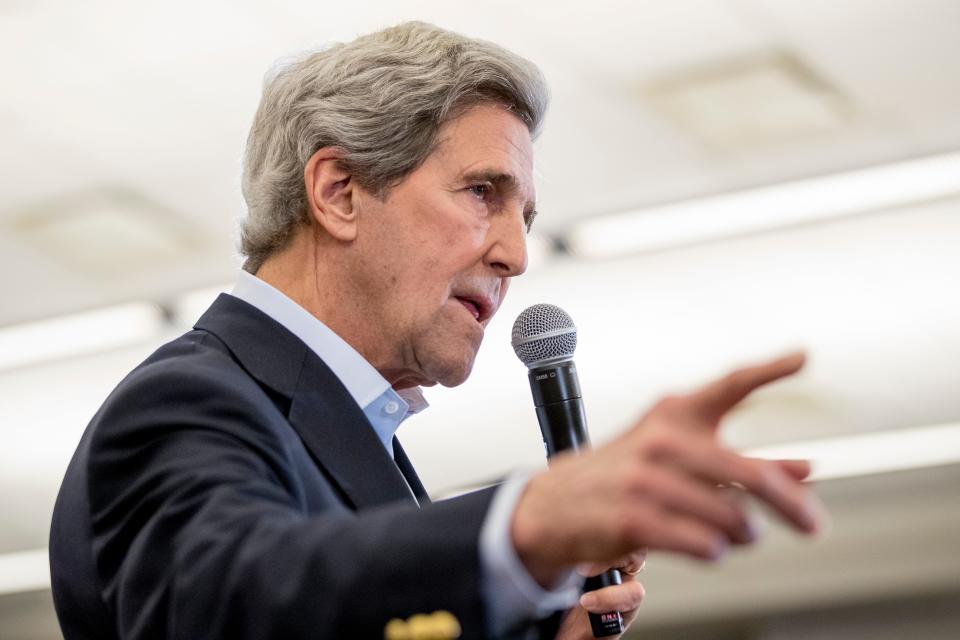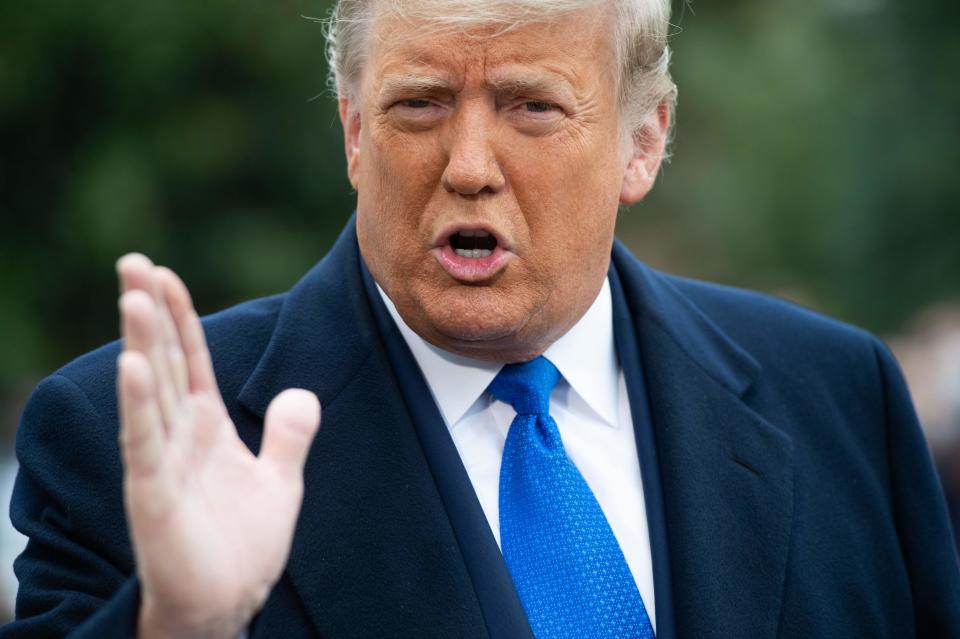I was an election monitor in Afghanistan. Trump's fraud claims follow a corrupt playbook.
- Oops!Something went wrong.Please try again later.
I was an election monitor in Afghanistan after a top candidate cried fraud in the 2014 presidential election and a recount was ordered. I could swap out his name with President Donald Trump's, and you wouldn't know the difference.
In April 2014, despite promises of widespread violence, millions of Afghans risked their lives to vote for a new president among eight candidates. With no clear winner, officials set a runoff election between Ashraf Ghani and Abdullah Abdullah for June 14. More than 7 million people went to the polls, again amid the threat of violence. In Herat province in western Afghanistan, the Taliban sliced off the inked fingers of 11 men to punish them for casting ballots.
Overall, though, the second round appeared to go smoothly until the numbers started rolling in. They showed Ghani ahead with 4.5 million votes to Abdullah’s 3.5 million. Abdullah was furious. He complained loudly of industrial-scale fraud, suggesting Ghani was stealing the election. Sound familiar?
Before the runoff ballots were even totally counted or any fraud found, the Abdullah campaign was promising Abdullah would not accept defeat. Abdullah campaign officials provided a variety of anecdotes of widespread ballot stuffing and unverified numbers to make their case, but no hard evidence.
Free and fair vs. fraud
"Calling an election unfair does not make it so," as federal appeals court Judge Stephanos Bibas, wrote last week in his decision handing Trump another legal defeat in his futile effort to overturn Joe Biden’s 2020 win. But what Trump and Abdullah’s claims do is sow doubt about the underpinnings of free and fair elections. The only difference is that Abdullah probably had a stronger case than the United States president, given long-standing corruption in Afghanistan.
But what it came down to in Afghanistan is who had more votes. “However, the mere presence of fraud rarely matters; the fraud must be great enough to change the results,” wrote Thomas Scherer, at the time a Princeton PhD candidate. "Does Abdullah really believe that he can overcome a million-vote difference?”
Did Trump really believe he could overcome a 154,000-vote Biden lead in Michigan, a nearly 12,800 lead in Georgia, a 81,000 lead in Pennsylvania or Biden’s nearly 20,500 edge in Wisconsin. Yet, Trump paid for a Wisconsin recount — and failed.
Changing, but not that much: It gives me no pleasure to be right, but Democrats were never going to win Texas in 2020
"We have asked our monitors to leave the offices of the (election) commission, and we are asking for the counting process to be stopped immediately," Abdullah said in a 2014 news conference. "We all know that the turnout was not as high as it was said. The exaggerated number of votes reported from the provinces was not in proportion with that area, let alone the security situation."
Election intervention
It almost seems like Trump took a page from Abdullah’s campaign revenge playbook.
"STOP THE COUNT!" Trump tweeted as the process played out. Claims of illegal voting, exaggerated turnout, stolen election. The disjointed, unhinged press conference Trump held two days after the election when it was becoming clearer that Joe Biden would be the next president resembled Afghanistan in 2014.
When Afghanistan's Independent Election Commission announced preliminary results giving Ghani a 1 million vote lead, some of Abdullah's supporters threatened or warned of violence in the streets.

Tensions were so great that then-Secretary of State John Kerry intervened. After all, the U.S. handed out over $60 million for programs supporting the 2014 election. Kerry appealed to Abdullah to accept the obvious by sharing his personal experience with his 2004 failed presidential campaign. He told of deciding not to contest controversial Ohio election results, which gave the advantage to George W. Bush. “It was hard to do, and many of my people were mad at me, but it was the right thing to do for the country,” Kerry said, according to the New York Times.
Trump hasn't overreached: Trump's pardons are troubling, but presidential pardon power is absolutely essential
Republicans are beginning to make the same case to Trump, though apparently not the people who might be able to persuade him.
Eventually, Kerry convinced Ghani to accept a recount of all second-round ballots. Abdullah then promised to accept the recount results as binding.
I worked with the Independent Election Commission (IEC) at the time and saw the UN-supervised recount go on for 50 days in August at a highly-secured location on a military base in Kabul. Outside the Quonset huts where the counting went on, U.S. military mine resistant ambush protected vehicles lined the street. Inside, national, international and candidates’ observers participated in the audit process. This audit was exceptional because it was a complete audit and physical inspection of each of the 23,000 ballot boxes. Those boxes had been airlifted to a secure warehouse and escorted by IEC staff and agents from both teams.
The Biden administration: Iran assassination highlights Biden's national security challenges. His team is up to it.
At each table, candidate representatives watched like hawks as each ballot box was opened and votes counted. My job was to stand behind the counters, like a strict school marm proctoring an SAT exam. The process was painstakingly slow. The goal was to get through a 1,000 boxes a day but we were lucky to get through 600. While candidate representatives sometimes tried to get us to side with them, we were forbidden to adjudicate disputes. We were there to watch for fraud or shenanigans. Occasionally, fights erupted and chairs were thrown. That broke the monotony.
A peaceful transition — eventually
In the end, the recount became irrelevant. Abdullah would never accept the results (sound familiar?) Kerry brokered a power-sharing agreement. Ghani would be president and Abdullah became chief executive , and they’d have equal numbers of minister appointments. Abdullah said he’d only sign off on a unity government if the final vote tallies were not made public, still insisting bitterly that the ballots were so badly tainted by fraud that they should never see the light of day.

For his part, Trump appears to have acknowledged Biden's win, but still refuses to concede. Last week the president tweeted that he told his officials to begin "initial protocols" for a transition to a Biden administration, because that is "in the best interest of our country."
There’s no chance of a power-sharing love-in with Trump and Biden, but finally the transition is underway. Still, there’s near certainty Trump will insist to his dying days — without any overwhelming proof — that the 2020 election was rigged, and he should have won.
Alicia Shepard, a former NPR ombudsman, spent 2014 and 2015 working in Afghanistan for non-profit news organizations and the U.S. government. Follow her on Twitter: @Ombudsman
You can read diverse opinions from our Board of Contributors and other writers on the Opinion front page, on Twitter @usatodayopinion and in our daily Opinion newsletter. To respond to a column, submit a comment to letters@usatoday.com.
This article originally appeared on USA TODAY: 2020 election: Trump's fraud claims make US elections echo Afghanistan

